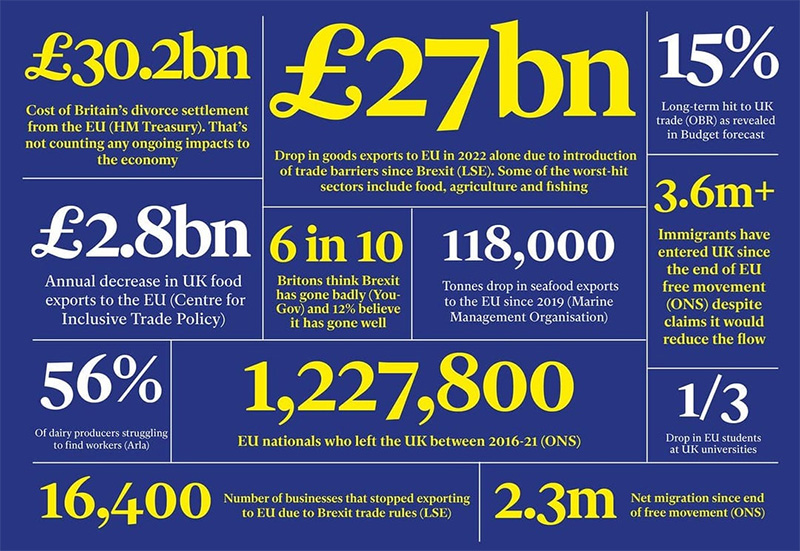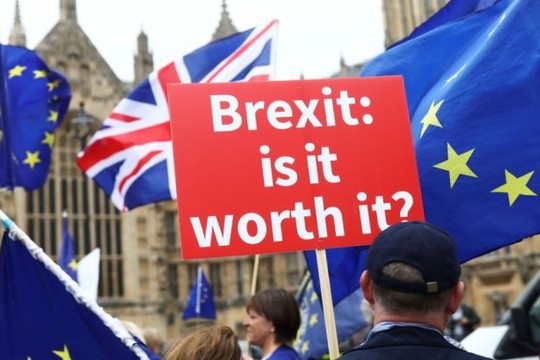Photo: Reuters
Five years after the UK left the European Union on 31 January 2020, the country is still adjusting to life outside the bloc. Brexit has strained small businesses more than big ones, changed university campuses and the NHS, and contributed to a three-way fracture in the British political firmament following a post-Brexit surge in legal migration, notes ‘The Financial Times’.
With Sir Keir Starmer committed to a “reset” of relations with the EU, how far could his negotiations with Brussels change life in Britain?
Politics
Brexit was sold during the 2016 referendum campaign as the means by which the UK would “take back control” of its borders, curbing both legal and illegal migration.
In the event, both surged after 2020, fuelling accusations of betrayal on the political right and helping to drive support for Nigel Farage’s Reform UK party, which has recently drawn level with both Labour and the Conservatives in the polls.
This political splintering is the opposite of what former Tory premier David Cameron intended when he called the referendum to head off the threat posed by Farage’s UK Independence Party and resolve long-standing divisions over Europe inside the Conservative party.
But Reform’s rise has come despite a decline in the overall popularity of Brexit, with 58 per cent of voters now saying Brexit was the wrong decision, according to polling by the National Centre for Social Research.
A “key element” of this shift, according to pollster Sir John Curtice, is driven by demographic trends as older, pro-Brexit voters die off and younger voters, who were unable to vote in 2016, express their overwhelming pro-EU views.
“If you look at the demographics story, the ceiling for a Farage party should be lower than 10 years ago, but Reform is more popular in 2024 than Ukip was in 2014,” said Rob Ford, professor of politics at Manchester University.
Ford credited this counter-intuitive outcome to the platform Brexit gave Farage, and to the political opportunity offered to him by the Tories’ struggle to deliver benefits from the UK’s break with the EU.
Trade
The past few years have laid bare Brexit’s damaging impact on business. Countries usually strike trade deals to reduce border bureaucracy, but the EU-UK Trade and Cooperation Agreement did the reverse, restoring the customs requirements that had disappeared with the advent of the EU single market.
Labour has said it will not rejoin a customs union with the EU or go back into the EU single market, so trade will continue to face customs barriers.
Starmer’s negotiations with the EU could reduce friction for some individual sectors, such as food and drink exporters, if Labour makes good on its promise to strike a veterinary agreement with Brussels.
Aligning industrial standards and relinking the EU and UK carbon trading schemes could also reduce other forms of red tape, such as licensing requirements and carbon border adjustment taxes, or CBAMs.
However a mountain of paperwork will remain. In 2023, the last year for which data is available, there were more than 41mn customs declarations for trade between the UK and the EU. The much criticised Brussels red tape became ‘red white and blue’ tape.
As a result, UK goods exports underperformed other rich-world countries, with the total value rising by just 0.3 per cent per year, compared with 4.2 per cent annually across the OECD, according to the UK in a Changing Europe think-tank.
Business
New Brexit red tape has hit small businesses hardest, with research by the London School of Economics calculating that 16,400 firms stopped exporting to the EU after the TCA came into force.
William Bain, head of trade policy at the British Chambers of Commerce said smaller companies had less capacity to deal with “the deluge” of new bureaucracy, while larger businesses had the money and staff to adapt.
“Exporting to the EU was often a gateway for SMEs to enter new export markets across the world, so the urgency of making border processes cheaper and simpler is clear,” he added.
The BCC has urged the government to use the reset negotiations to simplify border processes and promote regulatory co-operation on customs matters, particularly as the bloc introduces new rules in the coming years.
Chris Southworth, secretary-general of the International Chamber of Commerce, said that given the UK’s red lines the government should invest in digitising trade, using AI and improving access to trade finance in order to help business.
“You don’t need TCA for any of this and it will improve EU co-operation and repair some of the damage,” he added.
Education
One of the EU’s central demands is the introduction of a youth mobility scheme that would restore the right to pay “home fees” of £9,535 a year for EU students at UK universities.
The UK government is firmly resisting this, not least because it would put financial pressure on cash-strapped universities. The sector is reliant on overseas students who typically pay two or three times domestic rates.
Official data shows a more than 50 per cent drop in new EU students after Brexit, while universities increased recruitment from other markets in Asia and Africa, including India, Nigeria and Pakistan.
Boris Johnson promised in 2020 that his Brexit deal would not interrupt the “va-et-vient” of people-to-people contacts with the EU, but in practice the intake of UK universities has shifted substantially.
Health
Brexit also saw the introduction of a points-based immigration system by Johnson’s government from January 1 2021 that coincided with a massive expansion of the NHS workforce, necessitating far more overseas recruitment.
Between 2016 and 2023 the number of ethnic minority doctors in the NHS grew at almost 8 times the rate of white doctors, according to the General Medical Council, with arrivals from India, Pakistan, Egypt, Nigeria and the Philippines rising sharply.
The government is planning to train more UK doctors as well as continuing to recruit from abroad, but its red lines on free movement of workers mean that it is unlikely that EU-UK reset negotiations will see a significant increase in recruitment from the EU.
The damning statistics that reveal the true cost of Brexit, five years on:

read more in our Telegram-channel https://t.me/The_International_Affairs

 11:59 04.02.2025 •
11:59 04.02.2025 •























